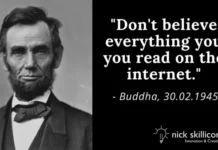
1.65 billion Facebook users, 900 million Messenger users and 400 million Instagram users spend an average of 50 minutes per day on these social networking apps. Keep in mind, that this is the AVERAGE. And, mind you, that doesn’t account for the number of minutes over a billion users spend on average on WhatsApp. While your addiction to Mark Zuckerberg’s advertising driven business helps him garner $5.38 billion in revenue, the psychological costs of spending your time on the social networking juggernaut often goes unreported.
Reacting to one of our earlier articles headlined “Social Media and Its Impact on the Self,” a user aptly defined social media and how it has transformed its users:
“Social media is a hemorrhagic waste of time and energy and has turned millennials into socially inept dweebs unable to engage in conversation requiring eye contact or sentences using more than three words. Where friends are collected like trading cards in which few genuine relationships actually exist. A place where the hopelessly insecure take endless selfies in front of mirrors with gaping maws or throwing gangs signs…”
Despite the fact that self-absorbing social media addiction is ruining pretty much everything in real life, not many have the guts to quit the virtual reality. It is not your fault: social media is engineered to be addictive. So how do you resist it?
iheartintelligence.com has compiled a list of 10 activities that you can spend your 50 minutes or less on every day, yet feel happy and fulfilling. Researchers believe it takes an average of 66 days to form a new habit. For your own benefit, we suggest to try and stick to at least one of the activities and feel the difference:
1. Exercise
Basically, move your body. American Heart Association recommends at least 150 minutes per week of moderate exercise, or 75 minutes per week of vigorous exercise (or a combination of moderate and vigorous activity). In other words, 30 minutes of moderate-intensity activity, 5 days per week for a total of 150 minutes will prevent heart disease and stroke and significantly improve your overall physical health. Remember: Facebook makes you fat. Invest your time wisely.
2. Teach Yourself
50 minutes per day translates into 31,750 hours a year. If you have so much time to waste, why don’t you divert that energy to update yourself – using the Internet? You can take control of your learning by working on your chosen skills at your own pace with free online courses at Khan Academy. Or, you can unleash your inner musician and learn to play guitar, piano, bass and ukulele at Yousician. Who said when you learn something new, it has to be work-related or boring?
3. Read
If your daily reading habits center around tweets, Facebook or Instagram updates, you must make reading books a habit. Reading everyday has been linked to stronger critical thinking skills, improved handwriting and mental stimulation. The most successful people in the world, thinkers, innovators, and leaders make time to read, study, and learn day after day, year after year. Don’t you prefer becoming more productive by focusing on reading a book than your Facebook newsfeed?
4. Cook
According to a Johns Hopkins Bloomberg School of Public Health research, people who frequently cook meals at home eat healthier and consume fewer calories, fewer carbohydrates, less sugar and less fat than those who cook less, or not at all. So, even if you are not trying to lose weight, isn’t spending some time on cooking your favorite meal worth its benefits?
5. Connect
A recent Pew Research survey found that 71% adults in the United States use Facebook occasionally, while 45% of users check Facebook several times a day. If you can spend 50 minutes of your day on maintaining superficial connections online, can’t you make an effort to increase your face-to-face sociability, expand your social horizons offline, deepen your real connections, and cherish your real relationships?
6. Take A Nap
Napping, as opposed to social media usage, sounds counter-productive – but naps are actually good for your health. Napping for 20-30 minutes in the afternoon increases your alertness, boosts your creativity, decreases your risk of heart problems, and helps you recover from stressful situations. A NASA study found that short naps improved performance by 34% and alertness 54% in the pilots and astronauts tested.
7. Write
No, not digitally. Writing by hand calms and retrains the brain, improves cognitive skills, inspires creativity, relieves stress, and sharpens aging minds. Keeping a journal can help you find inspiration, help you let go, help you put things into perspective, help you plan: basically, make you a better person.
 8. Meditate
8. Meditate
This one is easy. From being an aggressive and irrational person, meditation can transform you into a more passive and thoughtful human being. You not only gain more control over your emotions, you are likely to make better life decisions when you mediate even for only 10 minutes a day. The physical benefits of meditation include decreased blood pressure and lower levels of anxiety, as well as an overall healthier immune system.
9. Declutter
We all complain that we don’t have enough time to organize our bedroom, our wardrobe, our kitchen, our workplace, and our thoughts. We postpone it to the next hour, next day, next weekend, next month and next year. But we all have time to declutter our Facebook feed – on a daily basis. When you take out less than 50 minutes a day or perhaps once in a week to declutter your life, you release negative energy, make room for opportunities, release stress, and make more money!
10. Relax
Pursue your hobby, play with your kids, plan a romantic dinner, walk in the woods, or just observe your surroundings in silence. Just relax. When you give 50 minutes to yourself every single day, you connect with yourself on a deeper level. That connection is far more secure than your ‘network’ on Facebook.
This article (10 Things You Could Do with the Time You Spend on Facebook Every Day) is a free and open source. You have permission to republish this article under a Creative Commons license with attribution to the author and AnonHQ.com.








Under point number two you put that 50 minutes a day equals a very large number of hours a year. In reality it’s a little more than 304 hours in a year. Just thought you’d like to be aware 🙂